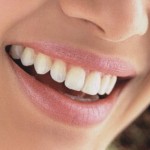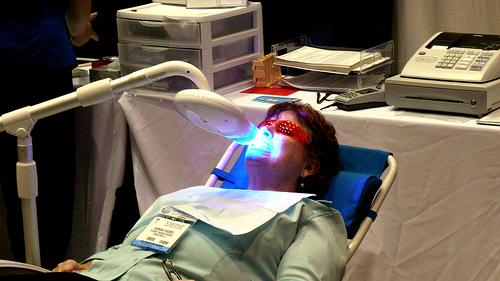
Laser Teeth Whitening Smile
Teeth whitening is one of the most popular cosmetic dental procedures commonly done to get rid of unsightly yellow teeth (To know more about the causes of yellow teeth or tooth discoloration, click here.) In recent times, the development of laser and media attention surrounding it has caused a dramatic increase in demand for laser teeth whitening or otherwise known as light-activated teeth whitening. Teeth whitening laser treatments are administered in-office by a qualified dentist to ensure its safety and efficacy as not everyone may be suitable.
What is laser teeth whitening?
Light-activated or laser teeth whitening systems incorporates the usage of a light source with a bleaching product, commonly hydrogen peroxide gel, which is applied onto tooth surfaces. This can be done either extra- or intracoronally, the former being most common.
How does laser tooth whitening work?
Essentially, light and laser have different applications in tooth bleaching. While both are used to increase the temperature of the bleaching agent, laser has an additional effect of causing tooth structure penetration, which may or may not be beneficial, depending on the circumstances. The light or laser source causes heat conversion which catalyses the chemical reactions of the bleaching agent through a process known as thermocatalysis. This acts to speed up its bleaching mechanism, thus whiter teeth can be achieved in a relatively shorter time. Some bleaching agents may contain chromophores, which are colored substances added to increase light absorption and hence the bleaching effect. Common professional laser tooth whitening systems that you might have come across include Zoom! and BriteSmile.
About the laser tooth whitening treatment
Depending on the severity of tooth stain or discoloration, laser tooth whitening treatment generally requires 2-3 appointments to achieve maximum results, with difficult cases such as intrinsic tetracycline staining possibly requiring more. While laser or light helps accelerate tooth whitening procedures, the question of whether it actually enhances the amount of shades whitened is a controversial one. Most dental practitioners believe the end result would be comparable to non-laser tooth whitening, thus making laser application unnecessary at times especially when the laser tooth whitening price is taken into account.
While you may come across over the counter products marketed as home laser tooth whitening systems, it is important to note that they are not the same as the systems used professionally. This is because over the counter products generally contain very low levels of bleaching agent and do not contain hydrogen peroxide, making the application of light rather futile as it has been widely researched that laser or light application only enhances whitening of certain bleaching agents. Also the light source provided is usually not of the desired nature (wavelength etc) as one would expect to work. Although some products seem promising, one should always take extra caution and asked your dentist before commencing laser teeth whitening at home.
Benefits of laser teeth whitening
- Shorter treatment time
- Results can be seen after just a single appointment
Risks of laser teeth whitening
- Expensive – laser teeth whitening cost up to 1,000 dollars
- Tooth sensitivity post bleaching – similar to other types of bleaching
- Greater chance of relapse compared to other types of bleaching – requires proper maintenance
- Heat or chemical used may cause irritation to soft tissues and dental pulp
- Internal bleaching of teeth which has been endodontically treated (i.e root canal therapy) are at risk of internal resoption
To know more about laser teeth whitening systems, simply contact your dentist for potential costs and options available.

Pingback: Teeth Whitening | Intelligent Dental
Pingback: Causes of yellow teeth | Intelligent Dental
Pingback: Laser teeth whitening in Sydney Australia and Melbourne Australia | Intelligent Dental
Pingback: Zoom Teeth Whitening System | Intelligent Dental
teeth whitening may also cause tooth sensitivity because most dentistst use peroxide based whiteners,.-